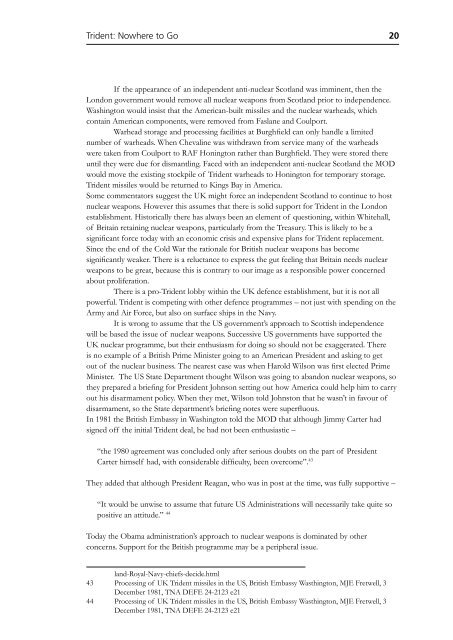Trident-NowhereToGo
Trident-NowhereToGo
Trident-NowhereToGo
Create successful ePaper yourself
Turn your PDF publications into a flip-book with our unique Google optimized e-Paper software.
<strong>Trident</strong>: Nowhere to Go 20If the appearance of an independent anti-nuclear Scotland was imminent, then theLondon government would remove all nuclear weapons from Scotland prior to independence.Washington would insist that the American-built missiles and the nuclear warheads, whichcontain American components, were removed from Faslane and Coulport.Warhead storage and processing facilities at Burghfield can only handle a limitednumber of warheads. When Chevaline was withdrawn from service many of the warheadswere taken from Coulport to RAF Honington rather than Burghfield. They were stored thereuntil they were due for dismantling. Faced with an independent anti-nuclear Scotland the MODwould move the existing stockpile of <strong>Trident</strong> warheads to Honington for temporary storage.<strong>Trident</strong> missiles would be returned to Kings Bay in America.Some commentators suggest the UK might force an independent Scotland to continue to hostnuclear weapons. However this assumes that there is solid support for <strong>Trident</strong> in the Londonestablishment. Historically there has always been an element of questioning, within Whitehall,of Britain retaining nuclear weapons, particularly from the Treasury. This is likely to be asignificant force today with an economic crisis and expensive plans for <strong>Trident</strong> replacement.Since the end of the Cold War the rationale for British nuclear weapons has becomesignificantly weaker. There is a reluctance to express the gut feeling that Britain needs nuclearweapons to be great, because this is contrary to our image as a responsible power concernedabout proliferation.There is a pro-<strong>Trident</strong> lobby within the UK defence establishment, but it is not allpowerful. <strong>Trident</strong> is competing with other defence programmes – not just with spending on theArmy and Air Force, but also on surface ships in the Navy.It is wrong to assume that the US government’s approach to Scottish independencewill be based the issue of nuclear weapons. Successive US governments have supported theUK nuclear programme, but their enthusiasm for doing so should not be exaggerated. Thereis no example of a British Prime Minister going to an American President and asking to getout of the nuclear business. The nearest case was when Harold Wilson was first elected PrimeMinister. The US State Department thought Wilson was going to abandon nuclear weapons, sothey prepared a briefing for President Johnson setting out how America could help him to carryout his disarmament policy. When they met, Wilson told Johnston that he wasn’t in favour ofdisarmament, so the State department’s briefing notes were superfluous.In 1981 the British Embassy in Washington told the MOD that although Jimmy Carter hadsigned off the initial <strong>Trident</strong> deal, he had not been enthusiastic –“the 1980 agreement was concluded only after serious doubts on the part of PresidentCarter himself had, with considerable difficulty, been overcome”. 43They added that although President Reagan, who was in post at the time, was fully supportive –“It would be unwise to assume that future US Administrations will necessarily take quite sopositive an attitude.” 44Today the Obama administration’s approach to nuclear weapons is dominated by otherconcerns. Support for the British programme may be a peripheral issue.land-Royal-Navy-chiefs-decide.html43 Processing of UK <strong>Trident</strong> missiles in the US, British Embassy Wasthington, MJE Fretwell, 3December 1981, TNA DEFE 24-2123 e2144 Processing of UK <strong>Trident</strong> missiles in the US, British Embassy Wasthington, MJE Fretwell, 3December 1981, TNA DEFE 24-2123 e21


